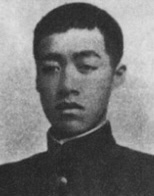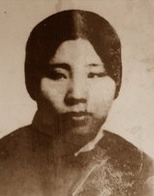Lin Jue Min’s farewell letter to his wife, written on a handkerchief, three days before the failed uprising against the Qing Government in 1911. He was 24 years old, one of Sun Yat-Sen’s revolutionaries. I have attempted a translation.
— T. Tang, 2011
Yi Ying my dearest. Please listen.
I am writing this to say my last goodbye to you. I write this as one who lives in this world, but by the time you read this, I would have become a shade in the underworld. Ink and tears flow in equal measure as I write. Time and again I have had to put my pen away, unable to finish, but I am afraid you would not understand why I would be so cruel as to leave you behind, that I would be uncaring of your sadness at my parting. And so I persist.
I love you dearly, to the end, and this love we have is what gives me the courage to face death. Since I have met you, I have often wished that all those who love would find their fulfilment. But everywhere I look the world is immersed in blood and turmoil. How many families can truly say they are happy? My country’s sadness is mine to bear. I am not like the great sages who can hold themselves aloof, unmoved by the travails of the world. It is said: “Decency is to take care of the old as you would your own parents, to take care of the young as you would your own children.” As my heart is filled with my love for you, so it is that same heart that yearns for a broader happiness, so that all who love, can find love. That is where I get my courage to leave you, to depart the world ahead of you. If I am leaving you uncared for, please understand, even in your tears of sadness, that I do this for every one of us, and be glad that the sacrifice we make of our love and your well-being, is for each, and everyone of us, in the hope of bringing a lasting happiness to our country. Do not feel so sad.
Do you remember, about four, five years ago, I once said, if we were to die, I wished that you would go first? You were angry when you first heard it, until I had a chance to explain. And even as you did not agree, you were unable to contradict me. What I meant was, I knew you would not have been able to bear the sadness of my death if I was to die first. My death would have left you in a cruel agony. I would rather that it was me who would bear the sadness of our separation in death. Alas, it is I who will have to go first!
I truly will never forget our time together. I remember our house in the back street, how we entered through the hallway, past the front and back parlors into the smaller parlor after a few turns, and the little room there where we have spent so much time together as husband and wife. Remember in the third or fourth months after we were married. It was mid-month. We looked out the window together, to see the village under moonlight and shadows, partly obscured by the bare branches of the plum trees. Side by side, hand in hand, softly spoken we talked. Was there anything we did not talk about? Were there any words of love we did not say to each other? Through my tears I remember. And I remember six, seven years ago, when I suddenly left mysteriously without telling you where. You told me tearfully afterwards: “From now on, you must tell me whenever you have to travel far away. I will follow you wherever you go.” I promised you then that I would. About ten days ago when I came home, I had wanted to tell you about this journey far away, but when I faced you I could not find words. And you were pregnant. I was afraid you could not bear it. If I have been taking refuge in drinks these last days, it is to contain my sadness.
I truly had wanted to live out my life together with you, but when I look around and see what can end our lives — natural calamities can kill us, thieves and robbers can kill us, the upheaval in the breaking up of China can kill us, corrupt, despotic officals who abuse us can kill us. In today’s China, death strikes us at any time, any place. When that time comes for us to die, should I watch you die with my open eyes, or should you watch me die? Can we do that? Even if we survive, what is to prevent us from being torn apart. And even if we look for each other until our bones turn into fossils, how many couples forced apart have ever gotten back together in all of history? It is worse than death. We are fortunate to be alive and together today, but how many were there who had wished to live and yet perished? How many couples who had wished to be together and yet were forcefully separated? Countless. How many of us in our time, who love as we do can endure any of this? This is why I have made the decision to lay down my life, even if it means leaving you. I will have no regrets. And if the country is not put to right, there will be others of like mind who will come after to carry on. Yi Sun is 5 now, he will be a grown man soon. Raise him well, let him be like me. I think that the life in your belly is a girl. It will look like you, and I am glad. If it is a boy, teach him about my aspirations, so that even with my death, there will be two others of the same mind. I should be so happy, so very happy.
You will be poor with me gone. Poverty is not a great hardship for a life lived simply.
I have no more words. If I should hear your cries from afar when I am in the underworld, I will cry together with you. I do not believe in ghosts, but now I hope ghosts do exist. Some people talk of hearts being joined. I hope there are such things, so that after my death, my spirit will follow close to you, always, and you will never be sad for the lack of a companion.
I had not revealed to you my ideals for our country. It is my fault. If I had told you, you would have been worried every day. I do not fear death, but I cannot bear your worrying about me. I love you, to the end, and I am afraid I have not been able to arrange everything properly for you. How fortunate we are that you met me. How unfortunately we are to have been born in today’s China. How fortunate I am to have you. How unfortunate to have been born in today’s China. A man cannot tend only to his self interest. What can I do? So much love, but such a small handkerchief. So many words from the heart left unsaid, but I know you can glean the rest. I won’t be able to see you again. I know you won’t be able to forget me. Would you see me in your dreams? I am tumultuous!
Written in the year Xinhai, the twenty sixth of the third month, in the fourth watch of the night.
All our female relatives can read. Please ask them for help if anything is unclear, I want you to really understand.
Lin was captured and executed after the failure of the uprising. His entire family went into hiding in a dilapidated house on the outskirts of Fuzhou. Members of the revolution came to visit them with news. One day, while Lin’s mother was cleaning, she found something stuffed in a crack of the door. It proved to be his letter to his wife, and a note to his father:
不孝兒覺民叩稟,父親大人,兒死矣,惟累大人吃苦,弟妹缺衣食耳,然大有補於全國同胞也,大罪乞恕之
“From your recalcitrant son Jue Min, with respect: My father, I am now dead. I regret bringing suffering upon you, and hardship on my brothers and sisters. But, on balance, it is for the greater good of our entire country. I beg your forgiveness for the enormity.”
To ease the sadness of Lin’s wife Chen Yi Ying, Lin’s brother gave his little daughter to her, to be a comfort — a daughter for a lost husband. When Chen gave birth, “the life in your belly” proved to be a boy. She died when the boy turned two years old, from a deep sadness, it was said. The post-revolution government found the child, and took good care of him. He was sent through college, and given a government post. He took little interest in politics and, unlike his father, lived a quiet life to the end. He passed away in 1983, survived by a son and two daughters.
Lin took part in the last unsucessful attempt to overthrow the Qing government. In October of the same year, 1911, the Xinhai revolution broke out all over China. This time, the regional armies of China mutinied against the central government. The last emperor, Pu Yi, abdicated early the following year. Some inferred that the Yellow Flower Hill uprising was the last catayst needed.
Lin was one of the “72” interred in the mausoleum at Huang Hua Gang. He would have been familiar with the old poem about those sent to the court of the first emperor, to try to end his reign, “while the shrill wind sang, over the cold water of the River Yi.”

